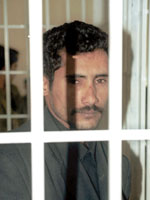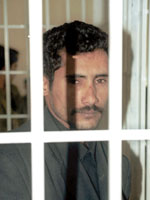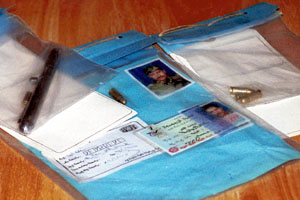
Yemenia Hijacker: I Expected The Death Penalty [Archives:2001/06/Front Page]
February 5 2001

He was sentenced to 15 years in prison for hijacking the plane and causing injury to one of the crew members, 5 years imprisonment for endangering the crew and passengers, 4 years in prison for having a fake ID card and one year more for carrying weapons without permission. But according to Yemeni law, if a person is convicted of several crimes and is to be punished for them, he is sentenced according to the most serious crime he has committed. The defendant is also to pay compensation for the damage he caused to Yemenia and Mr. Adli Al-Beghdady who was injured by a bullet during the hijacking attempt. The pen gun and the fake ID card are to be confiscated.
The hijackers prospects appeared bleak before the verdict was passed but later he described his sentence as unjust. However, he was happy as he said, I was expecting the death sentence. He did not say if he would appeal against the verdict, and his lawyer did not attend the last two sessions.
The trial of the hijacker started last Monday and continued for four sessions. During the trial proceedings, the hijacker gave conflicting justifications for his actions. First, he said he attempted the hijacking because he wanted to go to Baghdad as he admired Saddam Hussein. Then, he said he did it to express his resentment against the Border Agreement between Yemen and Saudi Arabia in which the Yemeni government assigned pieces of land to Saudi Arabia. After that, he said he wanted to use the passengers on board as hostages, in order to ask for a ransom. But, in the third session of the trial he said he was fed up with living in Yemen and that he did not have a job to support himself. He added that he had come back from Saudi Arabia just a few weeks previously but that he had been unable to stay there any longer as the police were aware that he did not have a visa. The situation is further confused by the fact that he has been living in Saudi Arabia for a long time and this can be clearly heard in his Saudi accent.

Sessions were attended by some diplomats from the US Embassy in Sanaa whose ambassador was among the 91 passengers on board the flight to Taiz Tuesday, January 23.
The courts verdict was not expected by the many people who described it as lenient and were expecting the death sentence. Otherwise, they claim, kidnappers of foreigners will see hijacking as another hobby to practice.
——
[archive-e:06-v:2001-y:2001-d:2001-02-05-p:./2001/iss06/front.htm]


